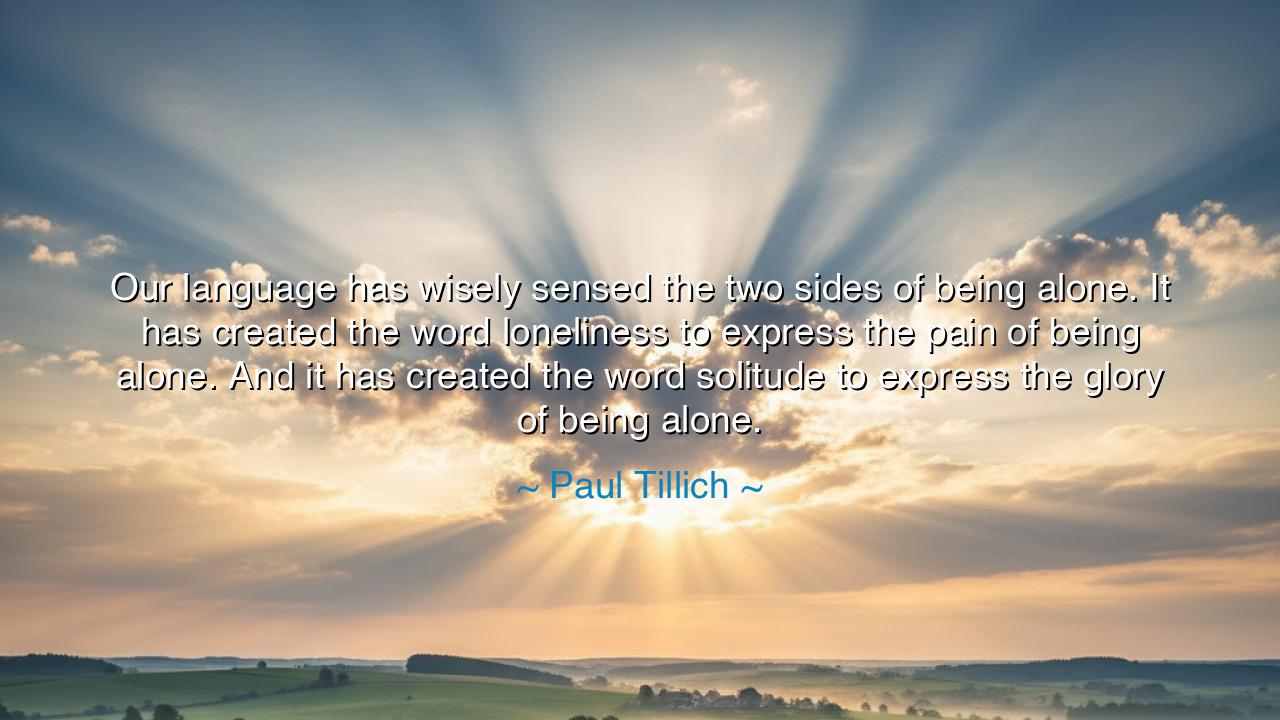
Our language has wisely sensed the two sides of being alone. It
Our language has wisely sensed the two sides of being alone. It has created the word loneliness to express the pain of being alone. And it has created the word solitude to express the glory of being alone.






In the wisdom of ages long past, there echoes a truth that transcends time — a truth captured by Paul Tillich when he said, “Our language has wisely sensed the two sides of being alone. It has created the word loneliness to express the pain of being alone. And it has created the word solitude to express the glory of being alone.” These two words — loneliness and solitude — are like twin spirits born of the same root, yet their destinies diverge: one walks in the shadow, the other in the light. Humanity has always grappled with the mystery of being alone, for within that state lies both suffering and salvation.
When one feels loneliness, the soul is adrift upon a vast sea, seeking the warmth of another heart and finding only silence in return. It is the ache of absence, the echo of laughter that once was, the hollow space beside the fire where no one sits. In loneliness, man confronts his own fragility — the yearning to belong, to be seen, to be loved. Even kings have trembled before it. Consider the mighty Alexander, conqueror of worlds. After his victories, when the cries of triumph had faded and the wine had soured in the cup, he looked out over his empire and found himself utterly alone. His glory filled the earth, but not his heart. Loneliness, that unseen conqueror, claimed him as its own.
Yet there is another path — the sacred path of solitude. Here, the soul is not abandoned, but liberated. In solitude, one does not feel the absence of others, but the presence of oneself. It is the stillness from which wisdom springs, the quiet soil where thought takes root and blossoms into insight. The hermits of the desert knew this well — those seekers who turned away from the noise of the world not to escape life, but to find its essence. In their silent caves, they conversed with eternity. In their aloneness, they discovered the divine pulse within their own hearts.
The poet, too, must know solitude. For without it, the muse does not come. Think of Wordsworth wandering lonely as a cloud — yet his loneliness became solitude, and his solitude became song. In that transformation lies the alchemy of the human spirit. To turn pain into beauty, isolation into creation — this is the triumph of the soul that dares to dwell alone without fear. For in such moments, man becomes both the sculptor and the stone, shaping his inner world with the chisel of reflection.
Language, Tillich reminds us, is wise. It knows that being alone is not one thing but two: it can wound, and it can heal. The difference lies in the gaze of the heart. When we resist our aloneness, it becomes loneliness — cold, heavy, unbearable. But when we accept it, when we breathe into it with trust and courage, it transforms into solitude — radiant, noble, and free. One imprisons; the other liberates. One shrinks the spirit; the other expands it beyond the stars.
The lesson is clear, my friends: do not flee from your own company. Learn to sit in silence without fear. Turn off the clamoring voices that demand distraction and listen instead to the quiet rhythm of your own breath. There you will find solitude, your oldest companion, waiting with open arms. It will teach you who you are beneath the noise. It will remind you that even in stillness, you are never truly alone, for the divine dwells within.
Let us, then, seek not to banish aloneness, but to understand its dual face. When loneliness comes, greet it as a messenger, a shadow that points toward the light. When solitude arrives, honor it as a teacher. Walk with it into the wild hills, or sit with it by the sea, and you will hear the whisper that has echoed through all ages: “Know thyself.” For in that knowing, pain becomes peace, and the burden of aloneness becomes the crown of self-realization.
Thus, the wisdom of Tillich endures — a call to balance sorrow with serenity, loneliness with solitude. To the one who learns this art, no night is too long, no silence too deep. For within the quiet heart, the universe itself begins to speak.






AAdministratorAdministrator
Welcome, honored guests. Please leave a comment, we will respond soon